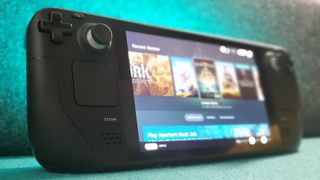Valve looks back at the Steam Deck's first month, and what's ahead
"Finding ways to improve battery life for Steam Deck is always high on our list."

It's been a month since the first Steam Decks went out, personally hand-delivered by Gabe Newell, and Valve has marked the occasion with a blog post looking back over the last month's worth of developments. To start with, there's the fact that 2,000 games now have the official seal of approval of being either Deck Verified or Playable.
"It's been exciting to see the variety of games the community has been playing - new or old, big or small, every genre - it seems like players have been having a ton of fun on Deck", Valve writes. "We're going to continue charging through the Steam catalog and can't wait to share the next big milestone here." If you want to help, Valve has added a feedback feature for Deck Verified games so Steam Deck users can agree or disagree with a rating.
On the subject of anti-cheat, which has held some games back from verification, Valve says, "The two biggest anti-cheat services, BattlEye and Easy Anti-Cheat, now have a streamlined path for developers that choose to enable support for Proton and Steam Deck. Elden Ring and Apex Legends are two examples of games which are taking advantage of this work, so far."
Updates to the Steam Deck's OS are noted, like improvements to the on-screen keyboard and dual trackpad typing, as well as the fact that the game mode keyboard can be used in desktop mode now, and the addition of keyboard themes. "We've spent some time making the Steam Store more responsive and snappier on Deck", Valve writes. "Plus we get that navigating through libraries can be unwieldy if you have a ton of games, so we’ve made it easier with fast scrolling. We've also added the ability to create dynamic collections within your library based on tags and other game characteristics."
On the subject of improvements to battery life, which is "always high on our list", Valve has added an option to drop the framerate to 15fps. As it says, "this setting works great for visual novels, puzzles and a lot of simulation games", while also noting "for those who love to tinker, we've made TDP (processor power), GPU Clock control, and FSR (screen scaling) settings available to optimize power even further."
Finally, Valve says it's been working with hardware partners including AMD on Windows drivers. "fTPM support is currently in beta, and once that ships Windows 11 can be installed. The last big piece is Windows audio drivers, and we hope to share good news about that soon."
That said, our Dave James tried jamming Windows onto a Steam Deck and didn't love it. "Windows is not made for small screen life," he said, "and nor is it designed for a dedicated gaming device, either. It's a multi-function operating system made for the Swiss Army Knife that is a modern PC. On something with such a pure focus on handheld gaming as the Steam Deck it's a mostly awkward experience."
PC Gamer Newsletter
Sign up to get the best content of the week, and great gaming deals, as picked by the editors.

Jody's first computer was a Commodore 64, so he remembers having to use a code wheel to play Pool of Radiance. A former music journalist who interviewed everyone from Giorgio Moroder to Trent Reznor, Jody also co-hosted Australia's first radio show about videogames, Zed Games. He's written for Rock Paper Shotgun, The Big Issue, GamesRadar, Zam, Glixel, Five Out of Ten Magazine, and Playboy.com, whose cheques with the bunny logo made for fun conversations at the bank. Jody's first article for PC Gamer was about the audio of Alien Isolation, published in 2015, and since then he's written about why Silent Hill belongs on PC, why Recettear: An Item Shop's Tale is the best fantasy shopkeeper tycoon game, and how weird Lost Ark can get. Jody edited PC Gamer Indie from 2017 to 2018, and he eventually lived up to his promise to play every Warhammer videogame.
Most Popular




